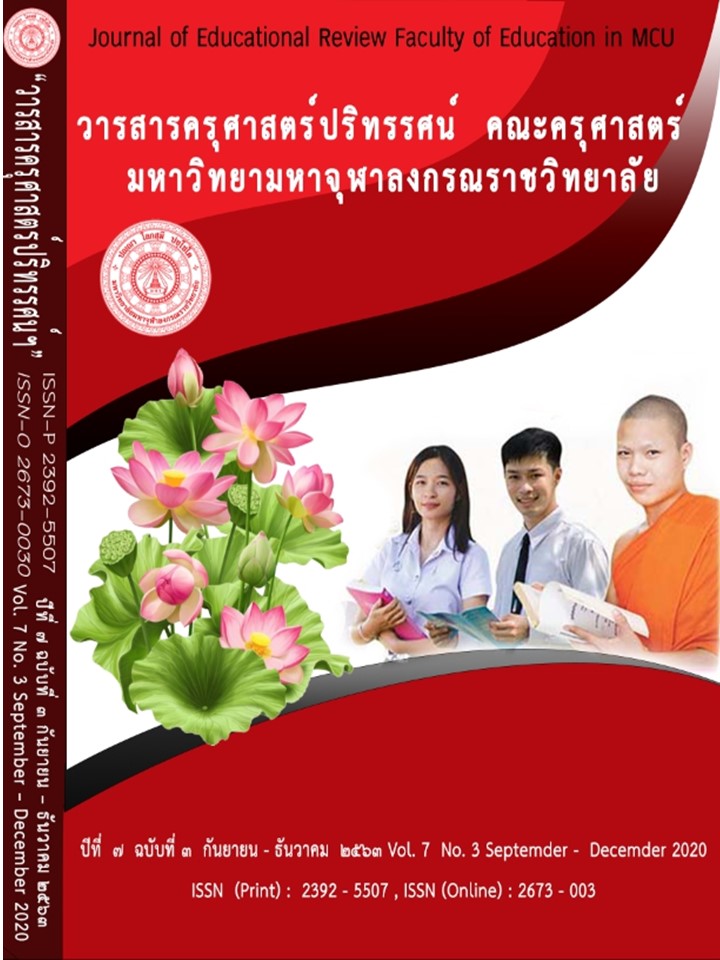ADMINISTRATIVE FACTORS AFFECTING THE SUCCESS OF SECONDARY SCHOOLS UNDER THE OFFICE OF THE BASIC EDUCATION COMMISSION
Main Article Content
Abstract
This research article objective is to study administrative factors affecting the success of secondary schools and create linear relationship model of administrative factors affecting the success of secondary schools. The contributor is teacher in secondary school under the Office of the Basic Education Commission, amount 480 persons. The tools used in the research were questionnaires developed by the researcher divided into 4 parts, which are part 1, leadership opinions, part 2 Status of opinions about organizational culture, part 3: Status of opinions about organizational commitment and part 4: state of opinions regarding administrative achievement of secondary schools. Analyze basic data of observable variables consisting of average, standard deviation, skewness, kurtosis. Analyze the correlation coefficient between latent variables used in the study. Confirmatory factor analysis to verify the validity of the latent variable measurement model and check the consistency of the hypothesis model with the empirical data By using SPSS program and assess the suitability of the model. The results of the data analysis showed that administrative factors affecting the success of secondary schools under the Office of the Basic Education Commission, there are 3 factors which are leadership factors organizational culture factors and organizational commitment factors. A model of causal relationships that are effective in the achievement of secondary school under the Office of the Basic Education Commission There are 3 factors which directly influence the success of secondary schools, namely leadership organizational culture factors and organizational commitment factors without statistical significance. Factors that indirectly influence the success of secondary schools are 2 factors which are leadership indirectly influenced the achievement of secondary schools through organizational culture with statistical significance at the level of .05 through commitment to the organization without statistic significance and organizational culture indirectly influenced the achievement of secondary schools through organizational commitment without statistically significant.
Article Details
ทัศนะและความคิดเห็นที่ปรากฏในบทความในวารสารฉบับนี้ถือเป็นความรับผิดชอบของผู้เขียนบทความนั้นเพียงผู้เดียว และไม่ถือเป็นทัศนะและความรับผิดชอบของกองบรรณาธิการ
กองบรรณาธิการขอสงวนสิทธิ์ในการคัดเลือกบทความลงตีพิมพ์และจะแจ้งให้เจ้าของบทความทราบหลังจากผู้ประเมินบทความตรวจอ่านบทความแล้ว
ต้นฉบับที่ได้รับการตีพิมพ์ในวารสารครุศาสตร์ปริทรรศน์ คณะครุศาสตร์ มหาวิทยาลัยมหาจุฬาลงกรณราชวิทยาลัย ถือเป็นกรรมสิทธิ์ของคณะครุศาสตร์ มหาวิทยาลัยมหาจุฬาลงกรณราชวิทยาลัย ห้ามนำข้อความทั้งหมดหรือบางส่วนไปพิมพ์ซ้ำ เว้นเสียแต่ว่าจะได้รับอนุญาตจากมหาวิทยาลัยฯ เป็นลายลักษณ์อักษร
References
เกษม วัฒนชัย. (2546). การพัฒนาคุณภาพการศึกษาไทย. กรุงเทพมหานคร: อรุณการพิมพ์.
จันทรานี สงวนนาม. (2545). ทฤษฎีและแนวปฏิบัติในการบริหารสถานศึกษา. กรุงเทพมหานคร: โรงพิมพ์บุ๊คพอยท์.
ชยาธิศ กัญหา. (2550). ปัจจัยที่ส่งผลต่อประสิทธิผลของสำนักงานเขตพื้นที่การศึกษา สังกัดสำนักงานคณะกรรมการการศึกษาขั้นพื้นฐาน. ดุษฎีนิพนธ์การศึกษาดุษฎีบัณฑิต. มหาวิทยาลัยบูรพา.
นลิน ศรพรหม. (2548). รับมือกับการเปลี่ยนแปลงในองค์การ. เพิ่มผลผลิต. 10(55). 23 – 25.
บัณฑิต ผังนิรันดร์. (2550). อิทธิพลของลักษณะองค์การ นโยบายการบริหารและการปฏิบัติงานสภาพแวดล้อมการทำงานภายในองค์การ แรงจูงใจในการทำงาน ความพึงพอใจในงานและความผูกพันต่อองค์การที่มีต่อประสิทธิผลของมหาวิทยาลัยราชภัฎสวนสุนันทา. ดุษฎีนิพนธ์การศึกษาดุษฎีบัณฑิต. มหาวิทยาลัยศรีนครินทรวิโรฒ.
ประเสริฐ บัณฑิศักดิ์. (2540). การวิเคราะห์ปัจจัยที่ส่งผลต่อประสิทธิผลองค์การของหน่วยศึกษานิเทศก์ กรมสามัญศึกษา. ดุษฎีนิพนธ์ครุศาสตรดุษฎีบัณฑิต. จุฬาลงกรณ์มหาวิทยาลัย.
พิสณุ ฟองศรี. (2542). การพัฒนารูปแบบการประเมินประสิทธิผลองค์การภาครัฐเกี่ยวกับการศึกษาอาชีพนอกระบบโรงเรียน. ดุษฎีนิพนธ์ครุศาสตรดุษฎีบัณฑิต. จุฬาลงกรณ์มหาวิทยาลัย.
ภรณี มหานนท์. (2529). การประเมินประสิทธิภาพองค์การ. กรุงเทพมหานคร: โอเดียนสโตร์.
ภารดี อนันต์นาวี. (2545). หลักการ แนวคิด ทฤษฎีทางการบริหารการศึกษา. ชลบุรี: มนตรี
มัลลิกา ตันสอน. (2544). พฤติกรรมองค์การ. กรุงเทพมหานคร: เอ็กเปอร์เน็ท.
ยุวราณี สุขวิญญาฌ์. (2549). การพัฒนาโมเดลเชิงสาเหตุประสิทธิผลองค์การของวิทยาลัยพยาบาลสังกัดกระทรวงสาธารณสุข. ดุษฎีนิพนธ์ครุศาสตรดุษฎีบัณบัณฑิต. จุฬาลงกรณ์มหาวิทยาลัย.
รุ่ง แก้วแดง. (2546). โรงเรียนนิติบุคคล. กรุงเทพมหานคร: วัฒนาพานิช.
รุจา รอดเข็ม. (2547). การพัฒนารูปแบบการประเมินประสิทธิผลองค์การของวิทยาลัยในสังกัดกระทรวงสาธารณสุข ประยุกต์ตามแนวทางการประเมินองค์การแบบสมดุล. ดุษฎีนิพนธ์ครุศาสตรดุษฎีบัณฑิต. จุฬาลงกรณ์มหาวิทยาลัย.
วิจิตร ศรีสอ้าน. (2549). การบริหารการเปลี่ยนแปลงและองค์กรแห่งการเรียนรู้. เอกสารอัดสำเนา.
สงวน ช้างฉัตร. (2541). พฤติกรรมองค์การ. พิษณุโลก: สถาบันราชภัฎพิบูลสงคราม.
สร้อยตระกูล อรรถมานะ. (2550). พฤติกรรมองค์การ : ทฤษฎีและการประยุกต์. พิมพ์ครั้งที่ 4. กรุงเทพมหานคร: สำนักพิมพ์มหาวิทยาลัยธรรมศาสตร์.
สำนักงานเลขาธิการสภาการศึกษา. (2550). รายงานการสังเคราะห์สภาวการณ์และปัจจัยที่ส่งผลต่อคุณภาพการศึกษาไทย. กรุงเทพมหานคร: วี.ที.ซี.คอมมิวนิเคชั่น.
สำนักงานเลขาธิการสภาการศึกษา. (2552). รายงานความก้าวหน้าการจัดการเรียนรู้ระดับการศึกษาขั้นพื้นฐาน. กรุงเทพมหานคร: เพลินสตูดิโอ.
สุพิณดา คิวานนท์. (2545). ความสัมพันธ์ระหว่างคุณภาพชีวิตการทำงาน ความผูกพันต่อองค์การและผลการปฏิบัติงานของพนักงานโรงงานอุตสาหกรรม อิเล็กทรอนิกส์. วิทยานิพนธ์วิทยาศาสตรมหาบัณฑิต. มหาวิทยาลัยเกษตรศาสตร์.
เสริมศักดิ์ วิศาลาภรณ์. (2541). ประมวลสาระชุดวิชาทฤษฎีและแนวปฏิบัติในการบริหารการศึกษา. กรุงเทพมหานคร: มหาวิทยาลัยสุโขทัยธรรมาธิราช.
Arroba, T. and James Kim. (1992). Pressure at Work: A Survivals Guide for Manager. 2th ed London: McGraw-Hill Book Company.
Kast, Fremont E., and Rosenzweig. (1985). Organization and Management: A System and Contingency Approach. 4th ed. New York: McGraw-Hill Book.
Lunenburg, Fred C. and Allan C. Ornstein. (2000). Educational Administration: Concepts and Practices. Belmont, California: Wadsworth Publishing Company.
Owens, Robert G. (1995). Organizational Behavior in Deucalion. 5th ed. New Jersey: Prentice-Hall.
Steers, R. M. (1977). Organizational effectiveness and work behavior. New York: McMillan.
Steers, R. M. (1991). Motivation and work behavior. 6rd ed. New York: McGraw-Hill.
Williams, Mark W. (2003). The Relationship Between Principal Response to Adversity and Student Achievement. Dissertation Abstracts International-A. 64(12). 4309.
Youngs, P., and King,M.B. (2002). Principal leadership for professional development to build School capacity. Educational Administration Quarterly. 38(5). 643-670.


